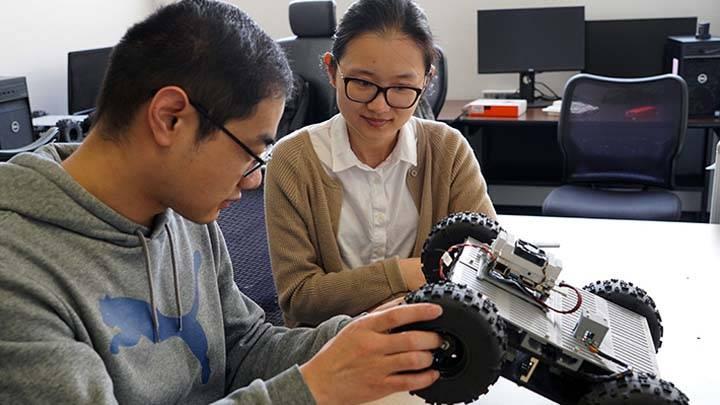San Diego State University has secured a $2.8 million grant from the National Science Foundation (NSF) aimed at expanding AI education and research opportunities for its students. This significant funding injection will bolster the university’s efforts to advance artificial intelligence knowledge and practical experience, preparing the next generation of innovators in this rapidly evolving field. The grant will support curriculum development, faculty research, and hands-on learning initiatives, positioning SDSU as a leading hub for AI education and innovation.
San Diego State University Secures Major Funding to Boost AI Programs
San Diego State University has been awarded a $2.8 million grant from the National Science Foundation aimed at significantly enhancing its artificial intelligence curriculum and research infrastructure. This funding will enable the creation of cutting-edge labs and the introduction of innovative AI courses designed to equip students with the skills demanded by the rapidly evolving tech industry. Additionally, the grant will support collaborative projects that foster cross-disciplinary research, bringing together experts from engineering, computer science, and data analytics to tackle real-world challenges through AI solutions.
Key enhancements include:
- Establishment of AI-focused research assistantships for undergraduate and graduate students
- Integration of ethical AI principles into the curriculum to promote responsible innovation
- Expansion of partnerships with local tech companies for hands-on student internships
- Workshops and seminars hosted by leading AI scholars and industry leaders
| Funding Use | Impact |
|---|---|
| New AI Labs | Enhanced hands-on learning environment |
| Curriculum Development | Broader course offerings in AI and ethics |
| Student Research Grants | Increased student participation in innovative AI projects |
Expanding AI Curriculum to Prepare Students for Future Tech Careers
San Diego State University will leverage a substantial $2.8 million grant from the National Science Foundation to significantly enhance its artificial intelligence curriculum. The infusion of resources aims to equip students with cutting-edge knowledge and hands-on experience, ensuring they are well-prepared to meet the demands of rapidly evolving tech industries. This initiative includes developing new courses, integrating AI-focused research projects, and fostering interdisciplinary collaboration across departments.
As part of the expansion, students will have access to:
- Advanced machine learning labs with real-world datasets
- Collaborative research projects alongside faculty AI experts
- Workshops on ethical AI implementation and emerging technologies
- Internship programs with leading tech companies in the AI sector
| Program Component | Expected Outcome |
|---|---|
| New AI Courses | Expanded student competencies in AI algorithms |
| Research Workshops | Enhanced critical thinking and innovation skills |
| Internship Opportunities | Increased job readiness and industry exposure |
Collaborative Research Initiatives to Drive Innovation and Learning
The recent NSF grant awarded to San Diego State University aims to bolster interdisciplinary collaboration among faculty, students, and industry partners. By weaving together expertise from computer science, engineering, and social sciences, this initiative will create a vibrant hub where innovative AI applications can be rapidly developed and tested. Focus areas will include ethical AI development, natural language processing, and autonomous systems, ensuring that research tackles real-world challenges while fostering practical learning experiences for the next generation of technologists.
To maximize impact, the program will offer students unique hands-on opportunities such as:
- Joint research projects with experienced mentors
- Industry internships to bridge theory and practice
- Monthly innovation workshops featuring guest experts
- Collaborative AI hackathons encouraging creative solutions
These efforts will not only enhance technical skills but also promote critical thinking and teamwork, essential in today’s fast-evolving AI landscape.
Recommendations for Integrating AI Across Diverse Academic Disciplines
To effectively harness the transformative power of artificial intelligence, institutions must adopt a holistic approach that bridges the gap between technical and non-technical fields. Introducing AI fundamentals into courses spanning humanities, social sciences, and health disciplines encourages interdisciplinary problem-solving and a richer understanding of AI’s societal impact. Faculty development programs and collaborative curriculum design are essential to equip educators with the tools and confidence needed to integrate AI concepts, ensuring students across all majors gain practical experience and critical thinking skills.
Moreover, partnerships with industry leaders and research centers can provide valuable hands-on learning opportunities, including internships, workshops, and AI-driven research projects. Aligning AI education with real-world applications fosters innovation and encourages diverse student engagement. The following table outlines key strategies for integration:
| Strategy | Focus Area | Benefit |
|---|---|---|
| Interdisciplinary Coursework | Curriculum Development | Encourages cross-disciplinary collaboration |
| Faculty Training | Professional Development | Enhances teaching capacity in AI |
| Industry Partnerships | Experiential Learning | Bridges academic and real-world skills |
| Student-Led Projects | Research & Innovation | Fosters creativity and leadership |
- Integrate AI ethics discussions to promote responsible development
- Leverage data literacy as a foundational skill across disciplines
- Implement modular AI learning units adaptable to various course structures
In Summary
The $2.8 million NSF grant marks a significant milestone for San Diego State University, promising to enhance AI education and research opportunities for its students. With this investment, SDSU aims to equip the next generation of innovators with the skills and resources needed to excel in the rapidly evolving field of artificial intelligence. As the university expands its AI programs, students and faculty alike stand to benefit from increased collaboration, cutting-edge tools, and real-world applications that will shape the future of technology. This initiative not only strengthens SDSU’s commitment to academic excellence but also positions it as a leading hub for AI innovation in the region.







